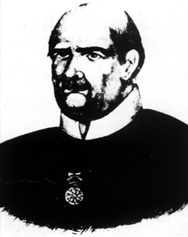
Joaquim Afonso Gonsalves (°1781-†1841).
Sinology, the study of the multifarious aspects of Chinese civilisation, is one of the most forgotten areas of Portuguese academic research, despite Portugal having been the first European nation to establish diplomatic and trade relations with imperial China.
The roots of Portuguese sinology lie in the small and strategic enclave of Macao. First settled somewhere between 1556 and 1557 by Portuguese sailors, the history of Macao is a veritable tale of political survival, reflecting the uncertain juridico-political legitimacy that always loomed over the Portuguese exercise of sovereignty within the territory and that led to few and irregular examples of cultural expression.
The big exception to the rule was the creation, by the Jesuits, of the Colégio Universitário de S. Paulo (St. Paul's University College), rightly considered the first example of a Western university to be established in the Far East.
According to Domingos Maurício, "[...] in terms of the turnover of teachers, students and missionaries, whether on leave, attending classes or on route to other destinations, the university, at least during the first half of the seventeenth century, was, according to Caldeira Rego in 1623, "[...] in terms of size and the number and quality of students, one of the largest and strictest religious establishments in the East."."1
The reason for the College's existence was to prepare missionaries for Japan and China. In order for this grand objective to be achieved, an understanding of the local language and culture was imperative. This fundamental strategy, however, was not generally accepted by the Jesuits in Macao who jealously guarded the moral and intellectual jurisdiction of their own cultural background and disobeyed the orders of the: Visitor Alessandro Valignano. This led the latter, in 1585, to write from Goa to the Bishop of Evora, Teotónio de Bragança, in the hope of having their study compulsorily enforced.
For reasons which are perhaps self-explanatory, this letter by Valignano has received very little attention. 2 However, once Michele Ruggieri had shown the way, the Asian dimension gained acceptance in academic circles as an integral part of missionary and evangelistic objectives. And among those who passed through the system were Mattteo Ricci, Adam Schall von Bell, João Rodrigues, Tomás Pereira, Álvaro Semedo, Duarte de Sande, and Gabriel de Magalhães, the very cream of the religious fraternity.
The College was closed in 1762, a victim of the anti-Jesuit stance of the Portuguese regime of the time. It was then uttered destroyed by fire on the 26th of January 1835.
Although the influence of St. Paul's College was exceptional in the cultural, pedagogic and religious fields, its inadequacies were woefully evident when it came to preparing orientalists and sinologists for work in civil society. The reasons for this lie both in the permanent political instability threatening Macao and the College's obsessive concentration on evangelical work.
The destruction of St. Paul's College marked the beginning of the end for Portuguese sinology with religious characteristics, especially as regards its international impact. Thenceforth, Portuguese sinology became an activity dominated by individuals, who, though brilliant and pioneering in many areas, were never able to construct a distinct school of thought capable of attracting a following.
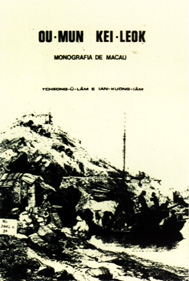
Macao by this time had already become a cultural melting pot. Unique in its position as Europe's first gateway into China, many foreigners, in their urge to 'explore' China, benefitted from the hospitality of the Portuguese of Macao, leaving records of what they witnessed. These records, rather than being ignored, should be considered auxiliary sources of Macao history. 3
Some outstanding works on China were published during this period, not least of which were Gaspar da Cruz' Tractado em que se contam muito por extenso as cousas da China [...] (A Long Treatise on the Subject of China [...]), 1569; Eduardo de Saude's excellent De missione legatorum iaponensium ad romanam curiam, in Europa [...] (Tratado do Reino de China or Treatise on the Kingdom of China), 1590; Álvaro Semedo' s Relação da Grande Monarquia da China (Narrative on the Grand Monarchy of China), 1637; António de Gouveia's Ásia Extrema (The Extreme Orient), 1664; and Gabriel de Magalhães' Nova Relação da Grande Monarquia da China (A New Narrative on the Grand Monarchy of China), 1688. The importance of these books can be gauged from the number of languages into which they were translated. There also exist many other works4 which, in order to make them more widely available, are in need of re-publishing. From a sociological point of view, one of the more curious examples is Relação da Conversão a nossa Santa Fé da Rainha & Principe da China & de outras pessoas da casa Real, que se baptizarão o anno de 1648 (Narrative on the Conversion to Our Sacred Faith of the Queen and Prince of China and Other Members of the Royal Household Who Were Baptised in the Year 1648), 5 a work presumed to have been written by Matias de Maia, a Jesuit Father.
For the appearance of a dynamic figure capable of reviving Chinese studies, we have to await the belated arrival of liberalism in Macao. On the 3rd of July 1795, a contract was signed between Macao's Leal Senado (the Municipal Council, literally 'Loyal Senate'), and Fr. Rodrigo da Madre de Deus obliging the latter "[...] to make all the Chapas [Seals] necessary for the functioning of the city in Chinese, translate those received from Portugal, to take charge of the Cartório Sínico [Chinese Records Office] and train one or more persons, be they Portuguese or descendants thereof, who can serve the city at such times as he shall be absent or in the event that he should return to Europe, assist personally at conferences considered necessary for the city, for which the salary of thirty Patacas per month shall be paid [...]."6 Fr. Rodrigo da Madre de Deus later delivered his letter of resignation to José Joaquim Barros, the Procurador do Senado (Municipal Council Procurator) of the time, in which he alleged deep reservations concerning the way the city was being run, as regards, in particular, the Portuguese:
"Therefore, I ask to be dismissed from my position, as I no longer find it possible to carry out my duties for reasons that are apparent to Your Worthiness. All materials belonging to the Chinese Records Office shall be left in the registrar's lodgings, who has been paid in advance until the end of the month, money for his food and board having already been requested up to the end of the said period. Quills and graded writing paper for whoever may replace me, who I am sure will serve Your Worthiness and the city with greater adequacy, have also been left in my lodgings. Chinese troops will, I believe, occupy the forts and the Chinese mandarins will impose further humiliations, for which the decision not to allow English troops to remain in Macao shall be fruitlessly regretted. When that day comes, then the difference between suffering a degree of submission to the most noble and honourable of nations or being captive to a vile and worthless state will be understood. In repayment for his good offices, Your Grace will be vilified and shown utter disdain. Such will be the way of those who have always been subject to their European masters. He who shall be responsible for this undignified humiliation and abasement of Macao's Portuguese, for which I choose not to be present, having decided to leave this unfortunate land for good, shall be made payable before God."7
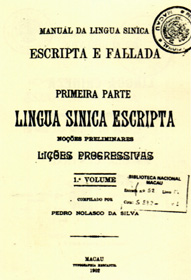
Further explaining the motives behind his untimely exit from Macao, he wrote to the Governor:
"The intractable hatred with which I am held by the Chinese, in the mistaken belief that somehow I was responsible for the arrival of British troops on Chinese soil, and the reluctance and shame I feel upon being recognised when amongst them, as occurred but a few days ago, draws from me, as if led in chains through the streets of the city, dread, that at any moment I may suffer some other new insult, no explanation having been asked for from the Chinese Mandarins nor the receipt of delivery of my person into the care of the Procurator having been returned. From where I stand, with the feeling I have that against the power of the Chinese the government is incapable of offering me protection, notwithstanding the valued efforts of Your Lord and lately the great number of supporters of France among us, I cannot help but regard everything about me in a very negative light. All these reasons, Your Illustriousness, are sufficient to give me cause to leave Macao, the population of which would certainly suffer much on my account, or due to the circumstances, or in any other complications which may arise between the city and the Mandarins, if I do not, seeing as the latter has no wish that they be told the truth. Therefore, I ask that Your Lord pardons me for the wrong I shall commit (if thus it be seen) in exiting Macao in such an underhand manner. I shall acquaint the King of the motives behind my decision, as I am sure Your Lord and the Illustrious Senate shall also, and I trust Your Highness would not look too disapprovingly upon me if I should suggest that the city does not have sufficient military resources to protect its subjects against the onslaughts of its barbarous neighbour. I leave Your Lord with a Chinese Seal so that he might reply to the impertinent questions that may be addressed to his person as a result of my resignation. As to the rest, I hereby swear my utter loyalty to our nation and our closest allies."8
These two letters by Fr. Rodrigo da Madre de Deus reveal, independently from the values they impart, that the studies undertaken by the Chinese Records Office were politically and not culturally motivated, the latter never being intended as a cultural institution to serve wider interests. Upsets in the political sphere had repercussions in the Registry, which prevented any medium-term cultural strategy from being outlined.
The efforts of the unfortunate Fr. Rodrigo da Madre de Deus look to have had some effect on the Royal Court in Lisbon. After almost thirty years, the Imperial Crown issued a surprising statement in these precise terms:
"Her Majesty the Queen, through her representative the Secretary of State for the Navy and the Colonies, hereby informs Father Joaquim José Leite, Rector of the College and Procurator of the China Missions in Macao, that aboard the good ship Novo Viajante, passage onboard said ship having been paid by the state, should be awaited the arrival of two Minoristas9 by the names of Joaquim José Chaves and José Maria Romão who shall forthwith present themselves to be employed in the study and service of the Missions; that the greatest effort possible be made to ensure, due to their knowledge of languages, especially that of Chinese, and sciences, for which there are presently teachers, their passage into Imperial China to undertake missionary duties; that the same August Lady greatly desires and recommends that the Macao Mission continues to perform those duties for which it was originally constituted and for which it is both worthy of preservation and promotion. For this reason and for the obvious advantages that can be garnered from the translation of learned Chinese texts. Her Majesty instructs teachers of said language, and principally Fr. Joaquim Afonso Gonsalves, to employ their talents in translation, providing annual reports on the progress of their work through the aforementioned secretary of state and submitting their finished work to be published at state expense. Furthermore, Her Majesty desires and wishes that there be established in the Colégio de S. José [St. Joseph's College] a museum exhibiting the rarest objects to be found in Imperial China and those which owing to their quality and rarity are worthy of being included in such a collection [...]. 10
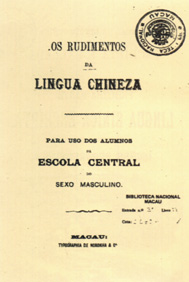
The above would appear to suggest a revolution of almost gargantuan proportions as regards the scope, value and importance of sinology and Chinese studies in general. For the first time, here were strong and objective signs that it was moving away from the political and into the cultural sphere. The Portuguese monarchy had come to understand that through culture invaluable insights and advantages could be obtained that might be of use in political affairs.
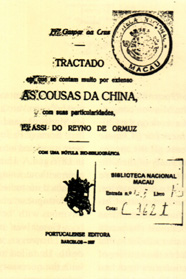
Two days later, the Queen drew up some new recommendations, further extending the scope of those originally stated:
"Her Majesty the Queen, through the Secretary of State for the Navy and the Colonies, suggests to the Governor of Macao the establishment of a library, to be comprised, principally, of books and maps written in Chinese, Japanese or other oriental languages and for the benefit of the missionaries in China as to be made known to the governor according to the decree here enclosed which on the 14th of this month was sent to the Mission Superior and in which Her August Lady requests the alteration of the clause therein requiring translations to be submitted to the aforementioned secretary of state for publication. It has been considered that it would be more convenient for their publication to be undertaken in this city, in close association with the translator, as the above mentioned governor will make officially known. Her Majesty also suggests the establishment of a museum housing the most rare oriental objects for which items from private collections should be included, and lastly the laying out of a small botanical garden for the growing of medicinal plants as used by the Chinese [...]."11
Within this context of cultural innovation, the erudite Fr. Joaquim Afonso Gonsalves (°1781-†1841) from Tojal in the Trás-os-Montes province of metropolitan Portugal was to assume a central role in the area of linguistic and lexicographic studies. Extremely gifted in music and mathematics, he was also a member of the Royal Asian Society of Calcutta and Academia Real das Ciências de Lisboa (Royal Academy of Sciences of Lisbon) and had been honoured with the title of Cavaleiro da Ordem de Nossa Senhora da Conceição de Vila Viçosa (Knight of the Order of Our Lady of Conception of Vila Viçosa). He arrived in Macao in 1813 with orders to continue on to Beijing, the necessary authorisation for which, however, was never forthcoming. As such he remained in Macao where he produced an extensive and noteworthy number of written works: Grammatica latina, ad usum sinensium juvencium (Latin Grammar, ad Usum Sinesium Juvencium Macau), 1828; Arte China, constante de alfabeto e gramática comprehendendo modelos das diferentes composiçoens (Chinese Art as Regards the Alphabet and Grammar Including Models of Different Compositions), 1829; Diccionario portuguez-china, no estillo vulgar mandarim e classico geral (Portuguese-Chinese Dictionary of Common and Classic Mandarin), 1831; Diccionario china-portuguez, no estillo vulgar mandarim e classico geral (Chinese-Portuguese Dictionary of Common and Classic Mandarin), 1833; Vocabularium Latino-Sinicum pronuntiatione mandarina literis latinis expressa, 1837; Lexicon Manuale Latino-Sinicum, continens omnia vocabula lantina utilia et primitiva, etiam scripturae sacrae, 1839; Lexicon Magnum Latino-Sinicum estendens etymologiam, prosodiam et, constructionem vocabulorum, 1841. After his death, a further two unedited works were discovered but were subsequently misplaced: Versão do Novo Testamento em Língua Chinesa (The New Testament in Chinese) and Dicionário Sínico-Latino (Chinese-Latin Dictionary).
The well-known French sinologist Abel Rémusat wrote the following critique in the September, 1831, edition of the "Journal des Savants": "Father Gonçalves of the Mission congregation in Macao is the author of a work on the Chinese language entitled Arte Chinesa [sic][Chinese Art]. To minister to his students all the means necessary to begin the practical study of the Chinese language, spoken as well as written, he wrote three volumes: a grammar and two dictionaries, one Chinese-Portuguese the other Portuguese-Chinese. In these he presents four fundamental ideas relating to the interpretation of Chinese characters and their classification. In a manner similar to that proposed by Montucci, he reduces the number of radicals commonly used in dictionaries from two hundred and fourteen to one hundred and twenty one, and he drew up a list of one thousand three hundred phonetic groupings which he called 'differences'.
This list, which covers seventy four pages and contains one thousand four hundred and eleven signs, he termed "The Chinese Alphabet". Arte China is more than just a mere etymological manual, however. It also contains examples of literary and vernacular styles, a section on grammar, a table of particles, forty four dialogues, extracts from Chinese history and mythology, official documents, and selected phrases in both Guangdongnese and Mandarin. [...] "It would be unjust to leave unrecognised the work of one so well-versed in his art. His first volume alone is sufficient to guarantee him a place of distinction between Varo and Prémare and the two academics Marhsman and Morrison.''''12
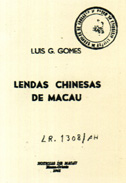
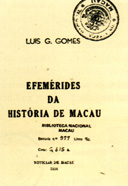
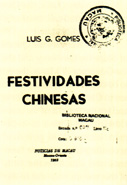
Some of Fr. Joaquim Afonso Gonsalves' works were translated into French by Count Kleczkowoski in 1876 and A. Hamelin in 1878. In Portugal, however, without a single title in publication, his work remained unstudied until the present era, a result of the Portuguese tendency to view 'foreign' as synonymous with 'better'.
Gonçalves' monumental scientific achievement, however, was not furthered beyond his death. He failed to create a following of students with the necessary perseverance to continue the arduous and absorbing task that he had set in motion. Both the recognition his work achieved and the profit gained from it came from learned thought outside Portugal.
As we can see, sinology and Chinese studies survived due to the work of outstanding individuals. These individuals, however, failed to create schools of disciples which could carry on the work already started. By looking at the organisation of education at the time then perhaps we can find some suitable answers for this.
In 1856, King Dom Pedro V published a law reorganising the education of the overseas clergy: "The education and instruction of the clergy and the preparation of missionaries for the Dioceses and Missions that fall under Royal patronage in Asia, Africa and Oceania shall be undertaken at the Colégio Central de Missões [Central Missions College] and at those Seminaries which already exist and that shall come into existence in the future in the above mentioned Dioceses [...] the lack of Liceus [grammar schools] and other public establishments of learning, the need for which is clear, shall be resolved according to the special circumstances to be found within each locality."13
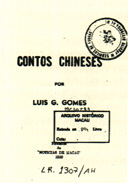
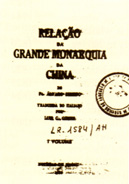
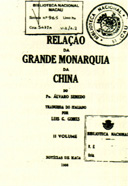
The intention here appears to have been a good one. An organised system of education would guarantee that learning and the clarification of values associated with a separation of powers, powers responsible for the continuation of existing social models, were passed down through the generations. This 'desirable mechanic', to use a concept dear to the heart of Gilles Deleuze, worked admirably unless unforeseeable circumstances arose, which, with the politico-ideological discord that occurred between the Bishop of Macao, Dom Francisco da Luz Chacim and the Lazaristas, 14 who were in favour of constitutionalism, is exactly what did happen in the case of Macao. Fr. Joaquim Afonso Gonsalves, a Lazarista, was forced to leave Macao in a hurry.
The "Eco do Povo" ("The People's Echo"), a local newspaper, published the following article:
"Three teachers from St. Joseph's College were imprisoned at the time. One of these became a vicar in Singapore, where he would later die, and the other two returned to the College which continued to give classes, albeit now more irregularly, taught by the latter two and some other newly-arrived Portuguese Fathers. After some time, two of the latter Fathers left for the Missions that had been their original destinations, two of the older teachers passed away, and, from those remaining, one was elected Bishop of Macao, a further his coadjutor and yet another Bishop of Nanjing. Thus, only the extremely virtuous, respectable and venerable Rev. Fr. Leite remained, continuing to teach Latin until 1854 when he passed away. And with him went the last vestiges of learning of Royal St. Joseph's College."15
The columnist could never have imagined that these internal controversies would completely undermine the entire credibility and prestige, rightly earned, of the educational establishments of the Church. As Fr. Manuel de Gouveia refers, "[...] ecclesiastical training in Macao has nothing to offer but a future of misery compared to the advantages to be gained from joining a commercial enterprise along the coast of China, where a clerk or salesman can expect to earn a monthly salary of between one hundred and two hundred thousand reals. Added to which is the fact that a chapter, a useful source of attraction, has yet to be organised. And this is all without even mentioning the difference in time and study necessary to prepare a youth to work among us, work which has no calling for the talents of a registrar, who considers himself qualified as such merely by having some notions of English."16
Once again, then, sinology was the victim of circumstances, circumstances which were completely beyond its control.
Which left the Procuratura dos Negócios Sínicos (Procuratory of Chinese Affairs). Established in 1583, the Procuratura (Procuratory), the Procurador (Procurator) of which had a place on the board of the Leal Senado, was originally a contemporary institution of the Municipal Council. In 1847, it came under the control of the government and in 1852 its exact functions regarding Chinese affairs were clarified. These functions were later strengthened in 1877 by a new law which granted it a special tribunal. Despite these developments, however, the Procuratory closed its doors for good in 1894. 17
It would be interesting at this point to list the names of some of the individuals, the first true sinologists, to have held the office of Procurator:
|
1583-1593
|
(unknown)
|
|
1594
|
Matias Penela
|
|
1595
|
Cosme de Paiva
|
|
1596
|
Bastião
|
|
1597
|
Miguel Monteiro
|
|
1598
|
Nicolau Martins Barroso
|
|
1599
|
António Carvalho Moura
|
|
1600
|
Pedro Martins Grivo
|
|
1601
|
Gaspar Fernandes
|
|
1602
|
António Fernandes Mata
|
|
1603
|
António Fernandes Mata
|
|
1604
|
António Fernandes Mata
|
|
1605
|
Sebastião Rebelo
|
|
1606
|
Sebastião Rebelo
|
|
1607
|
Francisco Monteiro
|
|
1608
|
Francisco Monteiro
|
|
…
|
…
|
|
1740
|
José Alexandre de Aragão
|
|
1741
|
Elias Manuel Grosses
|
|
1742
|
Luís Ruiz Rebelo
|
|
1743
|
António Aires Tercino
|
|
1744
|
Manuel da Silva Martins
|
|
…
|
…
|
|
1820
|
Domingos Pio Marques
|
|
1821
|
José Joaquim Barros
|
|
1822
|
Félix Vicente Coimbra
|
|
1823
|
João de Deus de Castro
|
|
1824
|
José Baptista de Miranda e Lima
|
|
…
|
…
|
|
1867
|
António Feliciano Marques Pereira
|
|
…
|
…
|
|
1870
|
Lourenço Marques
|
|
…
|
…
|
|
1877
|
Pedro Nolasco da Silva, e
|
|
|
Leoncio Alfredo Ferreira
|
|
…
|
…
|
|
1884
|
António Marques de Oliveira
|
There is much that can be said about these sinologists, especially those, and they number more than a mere few, who bequeathed us written material.
The Procuratory of Chinese Affairs was replaced in 1884 by the Repartição Técnica do Expediente Sínico (Technical Department of the Chinese Bureau), which was complemented by a "[...] school for the training of translators of Chinese and the study of written Chinese and the Guangdongnese dialect [...]", as stated in Article 12 of its regulations.
The Technical Department of the Chinese Bureau was headed by the following sinologists:
|
1885-1892
|
Pedro Nolasco da Silva
|
|
1892-1898
|
Eduardo Marques
|
|
1898-1911
|
Carlos Augusto Rocha de
|
|
|
Assumpção
|
|
1911-1920
|
José Vicente Jorge
|
|
1920-1928
|
Joaquim Fausto das Chagas
|
|
1928-1931
|
Pedro Nolasco da Silva Júnior
|
|
1931-1945
|
António Maria da Silva
|
This governmental body, empowered to act as linguistic intermediary between Macao's administration and society in general, was responsible for maintaining, at least until the 1970s, and however tenuously, the continuation of Portuguese sinology as a serious academic discipline. The interpreters, translators and sinologists, true emissaries of a new inter-cultural and strategic rationality, devised, in their diversity, all the internal mechanisms of historical arbitration that sustain Macao as a governable entity.
Amongst this list of brilliant individuals, Pedro Nolasco da Silva (°1842-†l912)18 stands out. The material he left us is invaluable:
Círculo de conhecimentos em portuguez e China [...] (A Compendium of Portuguese and Chinese Learning [...]), 1884; Fabulas (Legends), 1884; Phrases usuaes dos dialectos de Cantão e Peking (Common Phrases from the Guangdong and Beijing Dialects), 1884; Grammatica práctica da lingua chinesa (A Practical Chinese Grammar), 1886; Vocabulario e frases dos dialectos de Cantão e Peking para uso dos alumnos da Escola Central de Macau (Vocabulary and Phrases from the Guangdong and Beijing Dialects for Use in the Macao Central School), 1889; Compilação de phrases usuaes e de dialogos nos dialectos de Peking e de Cantão. Para uso dos alumnos da Escola Central de Macau (A Compilation of Common Phrases and Dialogues from the Beijing and Guangdong Dialects for Use in the Macao Central School), 1894; Os rudimentos da língua chinesa. Para uso dos alumnos da Escola Central do Sexo Masculino (The Rudiments of the Chinese Language for Use in the Central Boys' School), 1895; Manual da lingua sinica escripta e fallada: 2. a Parte. Língua sinica fallada. Vocabulario (A Manual of Written and Spoken Chinese: Part 2. Spoken Chinese. Vocabulary), 1901; Manual da lingua sinica escripta e fallada: 1. a Parte. Língua sinica escripta. Noções preliminares e Lições progressivas (A Manual of Written and Spoken Chinese: Part 1. Written Chinese. Preliminary Notes and Following Lessons), 1902; Língua sinica escripta. Traducção da Amplificação do Santo Decreto (Written Chinese. Translation of the 'Amplification of the Holy Decree '), 1903; Manual da língua sinica escripta e fallada: 2. a Parte. Lingua sinica fallada. Phrases Usuaes, dialogos e formulas de conversação (A Manual of Written and Spoken Chinese: Part 2. Spoken Chinese. Common Phrases. Dialogues and Conversational Structures), 1903; Bussola do dialecto cantonense (A Guide to the Guangdongnese Dialect), 1911; Bussola do dialecto cantonense adaptado para as Escolas Portuguesas de Macau (A Guide to the Guangdongnese Dialect Adapted for Portuguese Schools in Macao), 1912; Livro para o ensino da literatura nacional Kuok Man Kau Fo Shu. Traduzido em portuguez. (Book of National Literature Kuok Man Kau Fo Shu. Translated into Portuguese), 1912, and others.
The didactic and pedagogic layout of almost all of these works is uncommonly advanced for the time. Each lesson is methodically and diagramatically prepared in such a way as to facilitate the learning process.
Pedro Nolasco da Silva can be seen as a worthy successor to Fr. Joaquim Afonso Gonsalves insofar as his concern for the pedagogic and cultural factors confronting the teaching of the Chinese language.
The last great figure to emerge from the school belonging to the Technical Department of the Chinese Bureau19 was the Macanese sinologist Luís Gonzaga Gomes (°1907-†1976), whose tireless efforts can be divided into three areas: linguistics, music, and translations. From among the vast library of works he completed, of particular note in the area of linguistics and lexicography are: Vocabulário cantonense-português (Guangdongnese-Portuguese Vocabulary), 1941; Vocabulário português-cantonense (Portuguese-Guangdongnese Vocabulary), 1942; O estudo de mil caracteres (One Thousand Chinese Characters: A Study), 1944; and Noções elementares de língua chinesa (Chinese for Beginners), 1958; in the area of translations are: O clássico trimétrico (The Trimetric Classic), 1944; O clássico da piedade filial (The Classic of Filial Piety), 1944; As Quatro Obras: Discursos e diálogos [...] (The Four Works: Speeches and Dialogues [...]), 1945, Ou Mun Kei Leok (Monograph of Macao), 1950; and in the area of Chinese culture are: Lendas chinesas de Macau (Chinese Legends from Macao), 1941; O sistema de adopção na China (The System of Adoption in China), 1945; Contos chineses (Chinese Tales), 1950; Chinesices (Chinese Ways and Habits), 1952; Festividades chinesas (Chinese Festivals), 1953; and Arte chinesa (Chinese Art), 1954. With Luís Gonzaga Gomes, Portuguese sinology gave the world an insight into what had previously been inaccessible — 'inside information' on China. 20
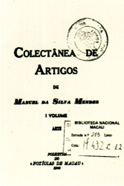
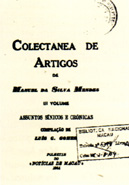
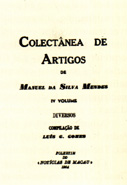
The Technical Department of the Chinese Bureau gave way to the Direcção de Serviços de Assuntos Chineses (Department of Chinese Affairs), which today no longer exists. The policy of administrative and bureaucratic sinology followed by the Portuguese authorities was extremely important in that it guaranteed the continued existence of channels of communication between governors and governed, rulers and ruled, not to mention the fact that it facilitated all the political and diplomatic decisions that were taken in Macao and China. The impenetrable workings of politics made the systematic teaching of the Chinese language and culture at the official level a non-viable proposition. Schools which taught in both languages tended to emphasise Chinese to the detriment of Portuguese, the latter being added as an almost token gesture.
This antipathy appears to have deep roots. The Escola Colonial (Colonial School), established at the very dawn of the Republican era, was given the principal objective of training and preparing administrative personnel for work in the Colonies. When it was reorganised in 1946 under the new title of Escola Superior Colonial21 (Colonial High School) and later Instituto Superior de Estudos Ultramarinos (Institute of Overseas Studies), Chinese language and culture were dropped completely from the curriculum:
"[...]
Article 72. The Instituto de Linguas Africanas e Orientais [Institute of African and Oriental Languages], as a centre of learning and research, has the following objectives:
1. To cultivate the study of philology, placing particular emphasis on the languages of Africa and the Orient;
2. To research the Arabic language, whether as a means of studying the history of the Portuguese in North Africa or as a factor towards achieving greater understanding of the world of Islam and its present influence in Guinea, Mozambique and India;
3. To study Sanskrit, both for its research and cultural value;
4. To study and systematise the Concanim language of Goa, as well as its literature;
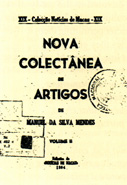
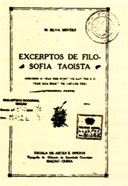
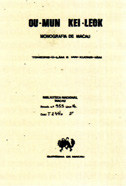
5. To study the Quimbundo language of Angola, the Ronga of Mozambique, the Sauili of North Mozambique, the Sena dialect of Zambezi, the Fula of Guinea, and the Teto or Galoli of Timor;
6. To study the Creole languages;
7. To conduct courses of learning in those languages studied;
8. To publish texts in those languages studied."22
Further diverse studies were made before the end of this period, but in the area of culture, and were weak in their command of the Chinese language. The comprehensive examination of the core elements of Chinese culture, essentially philosophy and literature, were undertaken by French, Italian and English-speaking researchers, who benefitted from the stronger and more highly-developed publishing industries in their countries.
A good example of cultural sinology can be found in the work of Camilo Pessanha (°1867-†1926), who honours the disenchantment of Chinese reality in his poetry and art. In his Elegias Chinesas (Chinese Elegies), revised by José Vicente Jorge, Pessanha states that an interest in things Chinese is not to be taken too seriously, as it is a "[...] worthless pastime spent in hours of melancholy spread over years of solitude."23 This, however, can be interpreted as a mere moment of low spirits on the part of Pessanha as at a conference in 1915 he openly stated the following: "[...] called, as so many young Portuguese are, whether dictated by fate or professional duty, they are condemned to spend several years in this remote and tiny Portuguese outpost — a veritable prison which demands loyalty — where they must suffer intellectual privations in order to dedicate themselves to the study of the language and civilisation of China in all its multi-faceted aspects. In the hours they have free, beyond the high service they render their homeland in taking compulsory classes, they obtain through their own devices an ineffable spiritual delight [...]."24
Pessanha's juridical texts, 25 above all those in which he attempts to compare Chinese mentality with that of a jurist trained in the canons of continental law, deserve reproduction as they are threatened with the same fate as that which befell the celebrated Caderno Poético (A Book of Poems) which disappeared without trace.
Another exponent of this form of cultural sinology is Manuel da Silva Mendes (°1876-†1931), a contemporary of Pessanha. Silva Mendes was a big collector of Chinese art and his deep knowledge of aesthetics and history led him into studying Daoist philosophy. He published two pioneering titles26 on the subject: Lao Tsz e a sua doutrina segundo o Tao Te King (The Doctrine of Laozi According to the Dao De Jing), 1908, and Excerptos de filosofia taoista [...] (Excerpts from the Daoist Philosophy [...]), 1930. Also, while on the subject of cultural sinology, mention should be made of the Jesuit Father Benjamin Videira Pires, whose work Os extremos conciliam-se (Extremes in Harmony), 1988, is a well executed examination of the mixed Chinese and Portuguese culture in Macao.
Closer to home, and as if coming to the end of a long and circuitous journey, stands the gigantic figure of the Jesuit Father Joaquim Guerra (o1908-†1993), considered the last of the Portuguese sinologists. He devised an innovative method for the alphabetical reading of the Chinese language and translated a good part of the Chinese classics: As Obras de Mâncio (The Works of Mencius), 1990; Escrituras Selectas (Selected Writings), 1990; O Livro das Mutações (The Book of Changes), 1990; O Livro dos Cantares (The Book of Songs), 1990; Quadrivolume de Confúcio (Confucius. Volumes I, II, III and IV), 1990. 27
These sinologists bequeathed us the substantive part of our multi-dimensional knowledge of Chinese culture and civilisation and whose work only an absentminded nation would allow itself to ignore, mislay or to fall out of publication for as far back as the mind can recall.
The collapse of a Portuguese school of sinology, the qualitative discontinuity in Portuguese sinology, can be blamed essentially on the specific nature of the juridico-political circumstances of Macao within the context of Sino-Portuguese relations and deficiencies in educational and scholarly organisation. And this is without mentioning the effect of external ideologies on the social and governmental balance within Macao. From its base in Terreiro do Paço (i.e., Praça do Comércio; or Commerce Square) in the heart of Lisbon, the imperial Portuguese government eyed the pearls on offer in its overseas territories but without recognising the cultural gem — sinology— it had within its grasp.
Without doubt, the Portuguese heritage in sinology is both extremely rich and varied. However, there is a need for published material which is both accessible and critical and also a systematic framework within the curriculum which would permit the development of teaching strategies and thus open the way towards greater interest in fields of research. There continue to be sinologists in Portugal, albeit few, who are greatly devoted to the study of the Chinese language and culture and exhibit an extraordinary strength of character permitting them to overcome the many obstacles they encounter.
As the popular poet Jose Joaquim Monteiro wrote:
"Assim, nesta Macau tão pequenina
Em íntimo convívio, muita vez,
Aprende o português a falar china,
E o china a falar português.
E quando assim não seja, então, gentinha,
Bem grita o português e ri-se o china,
E vão-se como o pato e a galinha,
Sem terem percebido patavina."28
("Thus, here in little Macao,
So tightly packed that often,
The Portuguese learn to speak Chinese
And the Chinese learn to speak Portuguese.
And for those who do not,
Then the Portuguese shout and the Chinese
snigger,
And they get along famously,
Without understanding a word.").
Through its irony, this poem quite faithfully describes the meeting of cultures in Macao. The very real linguistic barrier which exists, however, is overcome by a common understanding which extends to all levels, including that of the art of paradox.
Any assessment of the nature of that which has been attempted here is necessarily conditional and fragmented. The intention was to vent certain ideas with the purpose of establishing the guiding elements of Portuguese sinology29 in order that it should regain its place at the very heart of Portuguese culture, thus widening rationally the internationalisation and enrichment of the latter. At the present time, there is a fundamental need for the history of Portuguese achievement in this field to be made known, and the means by which that achievement came about, as well as a perspective of the place the Portuguese will occupy in the sinology of tomorrow.
Translated from the Portuguese by: Chris Foster
This text is derived from the notes of a lecture on História Concisa das Relações da China com o Ocidente (A Brief History of China's Relations with the West) given at the Escola de Línguas e Tradução (School of Languages and Translation) at the Polytechnic of Macao during the 1996-1997 academic year.
NOTES
1 SANTOS, Domingos Maurício Gomes dos, Macau: Primeira Universidade Ocidental no Extremo, Macau, 1994, pp.31-32 [2nd edition].
2 RULE, Paul A., K'ung-tzu or Confucius? The Jesuit Interpretation of Confucianism, Sydney, Allen and Unwin, 1986; PIH, Irene, Le Père Gabriel de Magalhães: Un Jésuite Portugais en Chine au XVIIéme Siècle, Paris, Fundação Calouste Gulbenkian-Centro Cultural de Paris, 1979; and others.
3 BOOTHROYD, Ninette - DÉTRIE, Muriel, eds., Le Voyage en Chine, Paris, Robert Laffont, 1992, p.325 — The Neapolitan Giovanni Gemelli-Careri describes a spectacle he attended during the course of his stay in Macao in 1695: "Je fûs voir le mardi une comédie chinoise. Un nombre de voisins joints ensemble la faisaient representer à leurs frais, au milieu d'une petite place. Le théatre était assez grand, et contenait trente personnes, tant hommes que femmes. Je ne pûs pas les entendre, parce qu'ils parlaient en langue mandarine, où de la Cour; cependant, je jugeai par leurs gestes, leurs tours et leur action, qu'ils étaient habiles. La piéce était mêlée de chants, avec un accompagnement de plusieur instruments de cuivre et de bois. Les habits étaient propres et enrichis de beaucoup de dorures; les acteurs en changeaient souvent. La comédie dura dix heures, et finit avec les chandelles; parce que quand un acte est fini, les acteurs se mettent à manger, et fort souvent les spectateurs en font autant." ("Tuesday I went to a Chinese comedy show.
A group of neighbours got together and decided to sponsor the event which took place at the centre of a small city square.
The theatre was quite large big enough to hold thirty men and women. I did not understand what [the actors] were saying because they spoke in Mandarin, the language spoken at Court, but I guessed the plot by the dexterity of [the actors] through their gestures, acrobatics and mouvements. The play blended with songs accompanied by several metal and wood instruments. The costumes [of the actors] were adequate [to the characters they played] and embellished with much gilding; and they frequently changed costumes. The comedy lasted for ten hours and finished by candlelight because whenever an act ended the actors stoped to eat and, most frequently, so did the spectators."
Compare this vivid account with that of Peter Mundy's as recounted by Charles Ralph Boxer, particularly as regards the ability to understand 'the Other'.
4 The historian José Maria Braga published a bibliographical list of this material, focusing in particular on those works written by clergy from the Macao diocese, spread over several editions of the "Boletim Eclesástico da Diocese de Macau" ("Ecclesiastical Bulletin of the Macao Diocese").
[See: BRAGA, José Maria, Jesuítas na Ásia, in "Boletim Eclesiástico da Diocese de Macau", Macau, 53 (609) Jan. [January] 1995, pp. 15-33; 53 (610) Fev. [February] 1995, pp.96-112; 53 (613) Maio [May] 1995, pp.289-303; 53 (616) Jul. [July] 1955, pp.426-448; 53 (617) Set. [September] 1995, pp.505-525; 53 (618) Out. [October] 1995, pp.568-586; 53 (619) Nov. [November] 1995, pp.626-655; 53 (620) Dez. [December] 1955, pp.711-730; 54 (621) Jan. 1956, pp.23-41; 554 (622) Fev. 1956, pp. 116-117; 54 (623) Marc. [March] 1956, p..197-219;54(627-628)Jul.-Aug. [July-August] 1956, pp.489-500;56(650)Jun. [June] 1958, pp.506-517;56(651-652) Jul.-Aug. 1958, pp.649-657; 56 (654) Out. 1958, pp.877-890; 56 (655) Nov. 1958, pp.965-978; 58 (673) Maio 1960, pp.418-429; 58 (675-676) Jul.-Aug. 1960, pp.608-620; 58 (677) Set. 1960, pp.698-710; 58 (678) Out. 1960, pp.800-809; 58 (679) Nov. 1960, pp.919-930; 58 (680) Dez. 1960, pp.982-993.]
5 This extremely rare booklet is in the possession of Charles Ralph Boxer, who disclosed its contents in 1938 in the "Boletim Eclesiástico da Diocese de Macau".
[See: BOXER, Charles Ralph, Charles Ralph, "Cidade de Macau e a Queda da Dinastia Ming (1644-1652): Relações e documentos contemporâneos reproduzidos, anotados e comentados pelo Capitão C. R. Boxer", in "Boletim Eclesiástico da Diocese de Macau", Macau, 35 (410) 1938, pp.775-809, pp.789-804].
[See: MAIA, Matias de (?), Relação da Conversão a nossa Santa Fé da Rainha & Principe da China & de outras pessoas da casa Real, que se baptizarão o anno de 1648 (Narrative on the Conversion to Our Sacred Faith of the Queen and Prince of China and Other Members of the Royal Household Who Were Baptised in the Year 1648, in BOXER, Charles Ralph, "A Cidade de Macau e a Queda da Dinastia Ming (1644-1652): Relações e documentos contemporâneos reproduzidos, anotados e comentados pelo Capitão C. R. Boxer", in "Boletim Eclesiástico da Diocese de Macau", Macau, 35(410) 1938, pp.775-809, pp.789-804].
6 Biblioteca do Leal Senado (Library of the Senate), Termo (Record)—3 Julho [July] 1795.
7 Biblioteca do Leal Senado (Library of the Senate), Carta (Letter)— 1 Marco [March] 1809.
8 Biblioteca do Leal Senado (Library of the Senate), Carta (Letter) — 6 Março [March] 1809, addressed to Governor Lucas de Alvarenga.
9 Translator's note: The term 'Minorista' is used to denote the lower ecclesiastical orders, such as the Franciscans, Augustinians, and others.
10 Boletim do Conselho Ultramarino: Legislação Novíssima, Lisboa, Imprensa Nacional, 1867, vol. 1 (1834-1851), p.52 — The Ordem Régia (Royal Order) quoted is dated the 14th of July 1838.
11 Ibidem., p.53 — The Ordem Régia (Royal Order) is dated the 16th of July 1838.
12 Article reproduced in the "Boletim Eclesiástico da Diocese de Macau ".
See: RÉMUSAT, Abel, Mémoires de la Congregation de la Mission, in "Journal des Savants", Sept. 1831; apud TEIXEIRA, Manuel, Os Lazaristas em Macau, in "Boletim Eclesiástico da Diocese de Macau", Macau, 39 (445) Ap. [April] 1941, pp.891-909, pp.896-897.
13 Boletim do Conselho Ultramarino: Legislação Novíssima, op. cit., pp.782, 784 — Lei (Law) dated the 18th of September 1856.
14 Translator's note: 'Lazarísta' was the name given to members of a religious sect founded by St. Vincent of Paul. The name derives from Casa São Lázaro (St. Lazarus Home), a residence at one time occupied by lepers and which was subsequently used by the Lazaristas.
15 "O Eco do Povo", Macau, (68), 1 Julho [July]; apud TEIXEIRA, Manuel, A Educação em Macau, Macau, Direcção dos Serviços de Educação e Cultura, 1982, pp.213-214. Other important documents on this issue are also reproduced in this work.
16 Carta (Letter) from Fr. Manuel de Gouvea to the Bishop of Macao, José Luís Alves Feijó, dated the 28th of February 1864; apud TEIXEIRA, Manuel, Arquivos da Diocese de Macau in "Boletim Eclesiástico da Diocese de Macau", Macau 68 (786) Feb. [February] 1970, pp. 108-127, p. 116— "O estudo Eclesiastico não promette em Macáo, senão hum futuro miseravel, comparado com as vantagens q offerece aos jovens o serviço dos escriptorios commerciaes por toda a costa da China, onde os caixeiros ou escrivãos costumão ganhar de 100 a 200 mil reis mensais, acrescendo a tudo isto o não haver em Macáo cabido organizado, q poderia attrahir algum; sem considerar-nos a diferença de tempo, e estudo necessários p. a o nosso estado, q náo requere o emprego dum escrivão, q se julga habilitado com huma lambuja de Ingles."
17 This, one of the great hiatuses in Macao history, is a story which has yet to be fully told.
18 ARESTA, António, O Neoconfucianismo na educação portuguesa: Pedro Nolasco da Silva na História da Educação em Macau, in "Administração: Revista da Administração Pública de Macau", Macau, 34 (9) Dezembro [December] 1996, pp.873-896.
19 Amongst those most unjustly forgotten must be counted the erudite sinologist Vicente Jorge, who published several works of value. Equally cast into oblivion has been José Martinho Marques (° 1810-† 1867), another sinologist, who published Princípios Elementares de Música ao Alcance de Todos (Elementary Principles of Music Made Understandable to All), in 1853, and left unpublished Dicionário Chinês-Português (Portuguese-Chinese. Dictionary).
See: "Boletim Oficial da Província de Macau e Timor" ("Official Bulletin of Macao and Timor"), 13 (27) 8 Julho [July] 1867, pp.153-158, p.157 [Parte Não Official - (left column)] — Where it is stated that "[...] he was untiring in his quest to master the Chinese language which was as difficult as it was special. Through his studies he gave us no few works both in Portuguese and Chinese."
Another sinologist to languish in obscurity is João Rodrigues Gonçalves (° 1806-† 1870), intimate friend of Governor Ferreira do Amaral. His published works are unknown. Two other sinologists must be mentioned: Leoncio Alfredo Ferreira (° 1849-†1920), who published pedagogic and moralist material; and António Feliciano Marques Pereira (° 1839-†1881), founder of the "Ta-Ssi-Yang-Kuo: Archivos e annaes do Extremo Oriente Portuguez" ("Ta-Ssi-Yang-Kuo: Archives and Annals of the Portuguese Far East"), 4 vols., Lisboa, Antiga Casa Bertrand-José Bastos, 1899-1904), review and author of Relação das attribuições da Procuratura dos Negócios Sinicos da Cidade de Macau [...] (Report on the Powers of the Procuratory of Chinese Affairs in Macao [...]), Macau, Typographia de J. da Silva, 1867, and As Alfândegas Chinesas de Macau. Análise do parecer da Junta Consultiva do Ultramar sobre este projecto (The Chinese Customs in Macao [...]), Macau, Typographia J. da Silva, 1867.
20 GERNET, Jacques, L'Intelligence de la Chine: Le Social et le Mental, Paris, Gallimard, 1994 — For this expression.
21 Decreto-Lei (Decree law) no.35885 —30 Setembro [September] 1946.
22 Decreto-Lei (Decree law) no.43858 — 14 Agosto [August] 1961.
23 PESSANHA, Camilo, QUADROS, António, ed. and anot., Obras de Camilo Pessanha, Lisboa, Europa-America, vol. 2, [n. d.], p.158.
24 China, Estudos e Traduções, Lisboa, Vega, 1993, p.61 [2nd edition].
25 OLIVEIRA, Celina Veiga de, Camilo Pessanha, o Jurista e o Homem, Macau, Instituto Cultural de Macau - Instituto Português do Oriente, 1993.
26 MENDES, Manuel da Silva, GOMES, Luís Gonzaga, ed. and coord., Colectânea de artigos de Manuel da Silva Mendes, in "Notícias de Macau", Macau, 3 vols., 1949 — For another title on this issue
27 This includes both publications by the Instituto Cultural de Macau (Cultural Institute of Macau) and Aidan Publicities and Printing.
28 MONTEIRO, José Joaquim, Macau Vista por Dentro, Macau, Direcção dos Serviços de Turismo, 1983, p.143.
29 There naturally remain many authors who there is no space to mention here in this brief outline.
See: ÉTIEMBLE, L'Europe Chinoise, Paris, Gallimard, 1989, vol. 2, pp.389-399—For literary material on Macao held at the Fondazione Cini (Cini Foundation) in Venice, Italy.
* B. Phil, by the Faculdade de Letras (Faculty of Arts), Universidade do Porto (University of Oporto), Oporto.
start p. 3
end p.